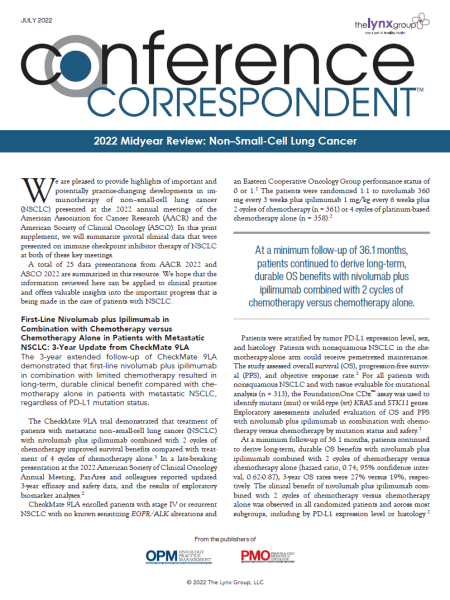Lung cancer is one of the most frequent types of cancer in the world, with a high fatality rate.1 The most common type of lung cancer is non–small-cell lung cancer (NSCLC), which accounts for approximately 84% of all occurrences.1 NSCLC is classified according to the genetic alterations that cause it. KRAS mutations account for approximately 25% of all cases, whereas KRASG12C mutations account for roughly 13% of all mutations.1 KRAS mutations have long been thought to be drug resistant and are frequently linked to poor patient outcomes.1
The US Food and Drug Administration (FDA) on May 28, 2021, awarded accelerated approval for sotorasib as treatment for adult patients with NSCLC and KRASG12C mutations who have had ≥1 previous treatments. This is the first KRAS-targeted treatment that has been approved. The approval was based on findings from a sample of 124 patients with locally advanced or metastatic KRASG12C mutation–positive NSCLC who had disease progression after receiving either an immune checkpoint inhibitor, platinum-based chemotherapy, or both treatments in the CodeBreaK 100 clinical trial.2
The objective response rate and response duration were the study’s main objectives. More than one-third (36%) of patients had a verified response to sotorasib, with 58% of patients experiencing a 6-month duration of response.2 Eighty-one percent of patients had disease control (full response, partial response, and stable disease for >3 months). The approved dose is 960 mg, but as part of the accelerated approval procedure, the FDA is mandating a postmarketing investigation to determine if a lower dose may have clinical benefit.2
The most common adverse events seen with sotorasib include diarrhea, cough, fatigue, musculoskeletal discomfort, nausea, and liver damage.2 In the trial, 9% of participants withdrew from the study because of unfavorable responses. Sotorasib can cause interstitial lung disease; hence, it should be used with caution if signs of interstitial lung disease appear, and it should be stopped completely if interstitial lung disease is identified. Liver function should be checked before and during treatment. If liver damage is discovered, the dosage should be reduced or the medication should be stopped. In addition, acid-reducing medications, pharmaceuticals that induce or are substrates for certain liver enzymes, and drugs that are P-glycoprotein substrates should be avoided during sotorasib treatment.2
The FDA also approved the QIAGEN therascreen KRAS RGQ PCR kit for analyzing tumor tissue, as well as the Guardant360 CDx for analyzing plasma specimens. Both tests will be used to confirm if sotorasib is an appropriate therapy for patients with NSCLC.2
References
- American Cancer Society. Key statistics for lung cancer. January 12, 2021. www.cancer.org/cancer/lung-cancer/about/key-statistics.html. Accessed June 1, 2021.
- US Food and Drug Administration. FDA approves first targeted therapy for lung cancer mutation previously considered resistant to drug therapy. May 28, 2021. www.fda.gov/news-events/press-announcements/fda-approves-first-targeted-therapy-lung-cancer-mutation-previously-considered-resistant-drug. Accessed June 1, 2021.

